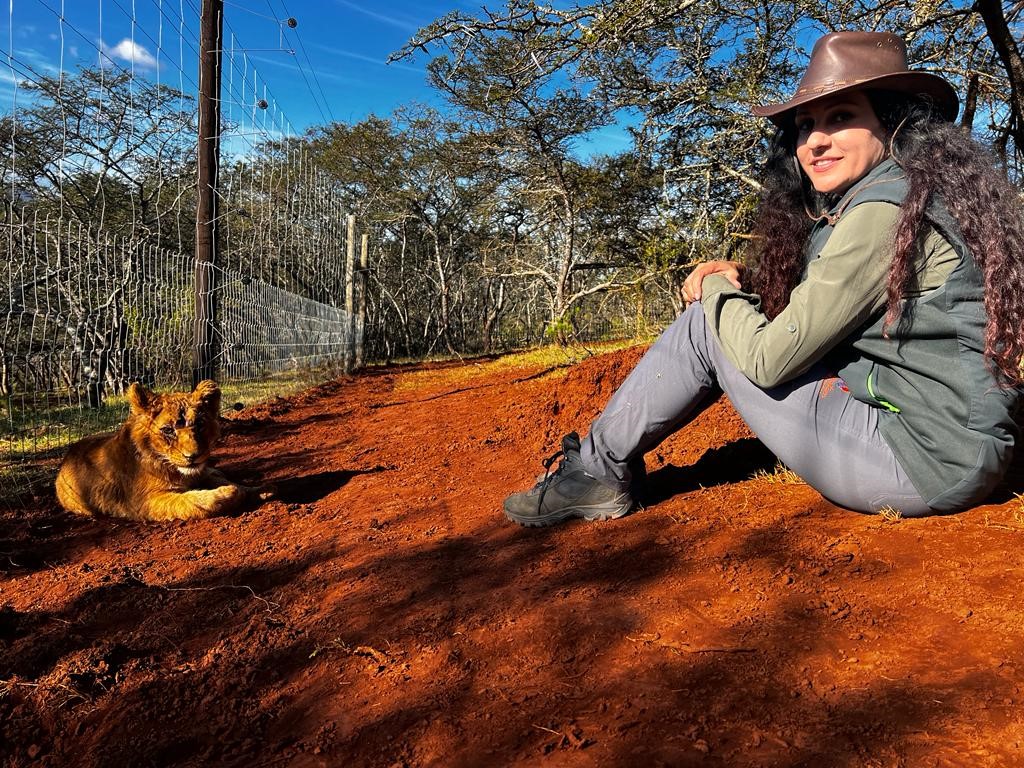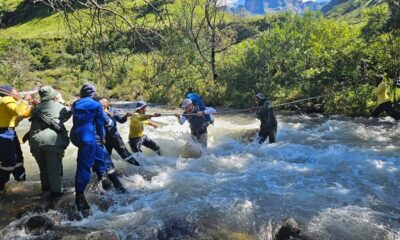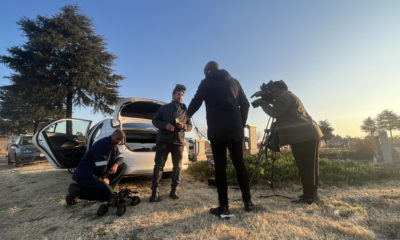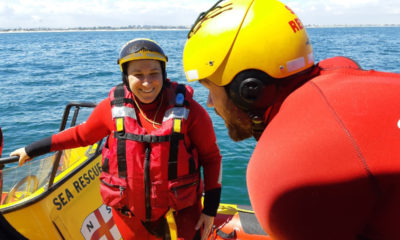
Banner

From holy land to grassland, lion cub finds safety
It took an undercover operation in Israel to rescue a lion cub that had been illegally trafficked and kept in an apartment with a rope around its neck. It has now been safely relocated to a reserve in the Eastern Cape in South Africa.
The male cub had been ripped away from its mother as a birthday present for someone’s granddaughter, and was then sold multiple times, moved between various apartments, and filmed for TikTok videos.

“The lion cub’s situation was absolutely heart-wrenching, but the undercover operation was extremely successful,” says Israeli conservationist Dr Nicole Benjamin-Fink, the founder and director of Conservation Beyond Borders (CBB). Now, the lion cub has been given a second chance at life by being relocated to the Warriors of Wildlife Simbonga Reserve and Sanctuary in South Africa’s Eastern Cape.
Benjamin-Fink was there every step of the way, as the cub, now named Zion-Neev, was transported via an El-Al flight to Johannesburg and then another flight to Nelson Mandela Bay. From there, he was taken in a bakkie to the reserve. Benjamin-Fink was the one who opened his container and saw him take his first steps to a new life. In the period between his rescue and new home, he was held at a protected facility in Israel.
“He has to be in his own enclosure as the other lions would see him as a threat,” she says. But she’s already seeing signs of integration: at dawn, the other lions in the park all roar together, and in recent days, for the first time, Zion-Neev has joined in.
Speaking to the SA Jewish Report, Benjamin-Fink says her work includes rescuing illegally-held animals. “We ensure the conservation of endangered species beyond political borders. My PhD background is on mathematical modelling, so a large part of what we do is we provide governments and management with models that predict the probability of extinction given different case scenarios.
“So, for instance, if there’s a rhino on a property, we can model all the ecological uncertainty, factor in expert opinion, and then advise on the best anti-poaching and biological strategy. We also try to reverse local extinction by moving populations across human-made borders.” And they work to resolve human-wildlife conflicts.
CBB deals in cutting-edge science, using artificial intelligence and game-theory “to make sure that the anti-poaching plans and strategies that we put together are feasible”, says Benjamin-Fink. “And that’s a big difference because if it’s not feasible economically and socially, it has low probability of acceptance.”
The lion cub was formerly named Abu-Malek, but was given his new name as a symbol of his new life. “Zion is another name for Israel, and Neev is after my son, who is very involved in conservation,” says Benjamin-Fink. “He’s only 13, but he has already been to Africa a few times and he’s responsible for our junior programme. He gives talks and has raised significant funds for conservation through his pictures of rhinos.
“CBB believes that we don’t own our wildlife, we’re the custodians of wildlife for future generations. This is why Zion-Neev is named after a 13-year-old advocate trying to change the trajectory of extinction.”
Benjamin-Fink became aware of Zion-Neev’s situation “when a TikTok started circulating of three men holding the rope that was around his neck, and one of the guys was talking to his granddaughter saying how proud he was that he had brought her a lion cub”.
Lions in captivity are often killed as they get older and more dangerous, she says. There’s a belief that tiger bones improve health, and although this is completely false, it has created a demand for tiger bones.
“So, because the supply for tiger bones is decreasing because of poaching, tiger bones are now subsidised by lion bones, which creates a whole new market for lion bones. So I was determined to save this cub.
“It’s safe to say that he was smuggled into Israel as part of the illegal wildlife trade and captive breeding,” she says. “It’s a unique case. A lot of reptiles and birds are smuggled into Israel, but it’s uncommon for a lion to be smuggled in.”
She says the Israeli police and army worked together to track down the cub. “He was eventually found abandoned in the location that was similar to the location on that original TikTok video. The assumption is that people got word [of the raid] and abandoned him.” She cannot speak further about the details of the operation.
“People keep lions in captivity for two main reasons. First, as a status symbol, in other words, ‘Look at me, I have a lion, not only am I rich, but I’m capable of taming the king of the animals.’ So we’re trying to combat the social misconceptions of bravery driving people to hold these wild animals.
“In addition, this specific lion was brought as a present, [which is another reason for the trade]. You’ll see animals circulating as pets or for pictures until they grow too old and dangerous.”
How Zion-Neev came to find a home in South Africa is “a very interesting chain of events”, says Benjamin-Fink. “I approached the head of zoos in all of Europe and they explained that there was actually an abundance of lions and no need for more genetic diversity. There’s also no need for more genetic diversity or social attachment in Israel.
“Therefore, we had to find Zion-Neev a place outside of Europe and Israel. CBB researched quite a few places before we narrowed it down to Warriors of Wildlife. The sanctuary has expertise in the rehabilitation and integration of wild animals. We’re confident in its staff and caregivers. At the moment, they live there 24/7 and tend to the animals. There’s one tiger and 14 lions.
“I’m confident that Zion-Neev will live out his life in a habitat that’s his safest option,” she says. Though he cannot be reintroduced to a pride, a cub of about the same age should be joining him, and they hope the pair will bond. At first, Zion-Neev walked only around the perimeter of his 2 500 square hectares of space, but now he lounges under a tree and is much more relaxed.
Benjamin-Fink hopes that Zion-Neev can become an ambassador in helping people to understand the harm of the illegal wildlife trade and captive breeding. “Every animal counts,” she says. One of her organisation’s primary goals is to “bring back the rhino from the brink of extinction”.
Finally, she says South Africa and the people in it have touched her heart. “I feel privileged to be able to help both individual animals and a species as a whole,” she says.
- To follow Zion-Neev’s journey and support the organisations that have brought him to safety, follow Conservation Beyond Borders, Warriors of Wildlife and Simbonga Sanctuary on social media, or visit their websites.










